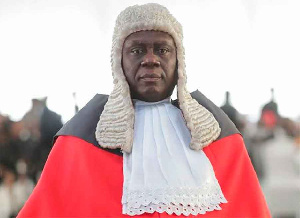 Chief Justice (CJ) Kwasi Anin-Yeboah
Chief Justice (CJ) Kwasi Anin-Yeboah
With only 404 judges and magistrates in a litigious country of more than 30 million people, access to justice may not be easily accessible to the poor and legally aided, Chief Justice Kwasi Anin-Yeboah has said.
Speaking at the opening ceremony of the Annual General Meeting of the Association of Magistrates and Judges of Ghana (AMJG) in Accra on Wednesday, 29 September 2021, Justice Anin-Yeboah said: “With a population of over 30 million, we have less than 404 judges and magistrates administering justice in a litigious society like Ghana”.
“The course of justice may not easily be accessible to the poor or the legally-aided litigant, who may equally not qualify for legal aid”, he noted.
However, Justice Anin-Yeboah noted, “We have to do our best within the limited logistical constraints to serve the justice needs of our compatriots”.
Talking about some of the constraints, he said: “For example, from Central Accra, that is Agyabeng to Nsawam, there is not a single court on that stretch until Amasaman and this should not happen in any civilised country.”
Additionally, he said: “The same situation is true for Kumasi.”
“From Kumasi Central to Obuasi, there is no court on the way and that is a distance of about 36 miles,” he noted.
“Nevertheless”, the CJ added, “we still have to adjust to these constraints and hope that the state will apply a bit more resources to provide court infrastructure to support justice delivery in Ghana”.
At the same event, Justice Senyo Dzamefe, the President of AMJG, said: “We feel disrespected about the way our allowances are paid as if it is a favour being done to us”.
“For so many years, members have not been paid any fuel allowance. It has always been a refund. As usual, we use our own money from our taxed salaries to purchase fuel,” he bemoaned.
Regrettably, he noted, fuel allowances of magistrates and judges, refunded later after many months, were taxed, as if they were paid upfront, adding: “In effect, we pay double tax for fuel.”
Justice Dzamefe said just as the court insisted very much on timelines in litigation, in their case, that was overlooked when it came to the payment of allowances.